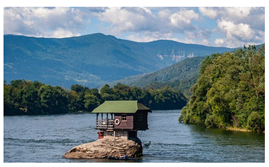In this lesson, you will learn all about geographical terms in the German language. This includes the names of cities and states, countries, the appropriate articles for each country, as well as the names of rivers, lakes, seas, islands, and mountains. Additionally, you will discover which prepositions are used with these terms and the rules governing the use of grammatical cases.
Thank you for reading this post, don't forget to subscribe!CONTENT
Name of the cities and countries
Countries
Rivers
Lakes and Seas
Islands
Mountains
Prepositions
Name of the cities and countries
All cities and the vast majority of countries are neuter and then the article does not stand before them:
Belgrad ist die Hauptstadt Serbiens. – Belgrade is the capital of Serbia.
Ich wohne in Deutschland. – I live in Germany.
Ich mache Urlaub in Italien. – I’m on holiday in Italy.
Before cities and countries stand an article if an attribute precedes them or if they are more precisely specified:
das Rome der 40er-Jahre – Rome in the 1940s
das schöne Italien – the beautiful Italy
A smaller number of states are masculine, feminine or in the plural, and then the article must stand before them:
Er fährt in die Schweiz. – He is traveling to Switzerland.
Mia kommt aus dem Sudan. – Mia comes from Sudan.
Wir wohnen in den USA. – We live in the USA.
Click on:
Grammar Content
Countries (Länder)
Here you will find a list of masculine, feminine and plural countries:
der: Iran(Iran), Irak(Iraq), Jemen(Yemen), Kongo (Congo), Libanon(Lebanon), Niger(Niger), Oman(Oman), Senegal(Senegal), Sudan(Sudan), Tschad(Chad), Vatikan(Vatican)
die (singular): Dominikanische Republik(Dominican Republic), Elfenbeinküste (Ivory Coast), Demokratische Republik Kongo(Democratic Republic of the Congo), Republik Kongo (BUT: der Kongo!), Mongolei(Mongolia), Schweiz(Switzerland), Slowakei(Slovakia), Ukraine(Ukraine), Türkei(Turkey), Zentralafrikanische Republik(Central African Republic)
die (plural): Bahamas, Färöer Inseln (Faroe Islands), Kapverdischen Inseln(Cape Verde Islands), Komoren (Comoros), Malediven(Maldives) , Niederlande (Netherlands) , Philippinen(Philippines), Salomonen(Solomon Islands) , Seychellen (Seychelles) , USA, Vereinigten Arabischen Emirate(United Arab Emirates), Vereinigten Staaten (von Amerika)(United States (of America)) [=die USA!] [=the USA!]
River (Flüsse)
German river names are feminine or masculine:
die: Weser, Werra, Fulda, Donau (Danube), Spree, Lahn, Elbe, Oder, Maas (Meuse), Mosel (Moselle), Nahe;
der: Aland, Bober, Inn, Kocher, Lech, Main, Neckar, Regen, Rhein, Ruß; Weißer/ Schwarzer Schöps.
Foreign river names are mostly masculine:
der: Nil (Nile), Kongo (Congo), Amazonas (Amazon), Orinoko (Orinoco), Paranä, Uruguay, Jenissei (Yenisei), Mississippi, Jangtsekiang(Yangtze), Ganges, Indus, Euphrat(Euphrates), Tigris, Don, Bug, Ebro, Tiber, Po.
Most river names ending in -ai and -e are feminine: die Wolga, Lena, Moskwa, Adda (BUT: der Paranä); die Loire, Rhone, Seine, Themse.
Lakes and Seas (Seen und Meere)

The words sea and lake themselves are part of the name, and then the article lake and sea is determined according to them. E.g:
- der See : der Chiemsee / der Bodensee …
Er badet im Bodensee. –He swims in Lake Constance.
- das Meer: das Mittelmeer (the Mediterranean Sea) / das Schwarze Meer (the Black Sea) / das Adriatische Meer (the Adriatic Sea) …
Sie fahren morgen ans Mittelmeer. –You’re travelling to the Mediterranean tomorrow.
- der Ozean: der Atlantik (the Atlantic) / der Atlantische Ozean (the Atlantic Ocean), der Indische Ozean (the Indian Ocean) …
Wir machen Urlaub am Atlantik. –We are on holiday on the Atlantic.
There are two exceptions though, two words for sea: das Meer and die See (der See means lake.) See two examples below:
die Nordsee -The North Sea
die Ostsee – the Baltic Sea
Islands (Inseln)
Almost all islands are neuter, so they stand without an article:
Rhodos, Korfu, Zypern
For example:
- Rhodos ist eine tolle Insel. – Rhodes is a great island.
- Auf dem wunderschönen Rothos mache ich jeden Sommer Urlaub. – I go on holiday to the beautiful Rothos every summer.
If the word “Insel” is found in the name of the island, then it is feminine, and the name is always preceded by an article: die Herreninsel
For example:
- Die Tedingsinsel liegt im Hiddensee. -Tedingsinsel is located in the Hiddensee.
Mountains (Bergen)
Mountains are mostly masculine (probably derived from der Berg):
der: Brocken, Großglockner, Große Arber, Kieferle, Kyffhäuser, Elm, Melibokus, Säntis, Ortler, Piz Palü, Monte Rosa, Montblanc, Olymp, Elbrus, Vesuv, Kilimandscharo, Popocatepetl, Nanga Parbat.
Some mountain names ending in -a are feminine: die Schesaplana,
Marmolata; (BUT:) der Ätna.
As is the case with gender in the German language, there is no special rule here either, so you have no choice but to learn these terms by heart. People will still understand you if you don’t use the correct one(s) but it is better to try to get them right. They are not difficult to learn as they mostly follow the same pattern.
Click on:
Grammar Content
Prepositions
In the question, the preposition aus must be followed by the article, let’s see how it looks:
Woher kommen Sie?
(DER) Ich komme aus dem Iran, aus dem Jemen, aus dem Sudan.
(DIE) Ich komme aus der Schweiz, aus der Türkei, aus der Slowakei.
(Plural) Ich komme aus den Niederlanden, aus den Vereinigten Staaten. Ich komme von den Fillipinen.
If you come from one of the archipelagos, use the preposition VON.
The preposition AUS requires the DATIVE and that is why we wrote in the sentences:
AUS DEM – before masculine and neuter nouns
AUS DER – before feminine nouns
AUD DEN – before plural nouns
Wohin fahren Sie?
(DER) Ich fahre in den Iran, in den Jemmen, in den Sudan
(DIE) Ich fahre in die Schweiz, in die Türkei, in die Slowakei.
(Plural) Ich fahre in die Niederlande , in die Vereinigten Staaten.
Ich fahre auf die Filipinen.
AUF + ACCUSATIVE, this preposition is used when we travel to an island.
Wo wohnen Sie?
(DER) Ich wohne im Iran, im Jemmen, im Sudan
(DIE) Ich wohne in der Schweiz, in der Türkei, in der Slowakei.
(Plural) Ich wohne in den Niederlande, in den Vereinigten Staaten.
Ich wohne auf den Filipinen.
Here, the preposition in is followed by the DATIVE. Otherwise, the preposition in can stand with both the DATIVE and the ACCUSATIVE, and that depends on the verb, in dem merges into im.
If you have any questions or want to comment, I’m happy to answer.
See more:
Bis zum nächsten Mal!



